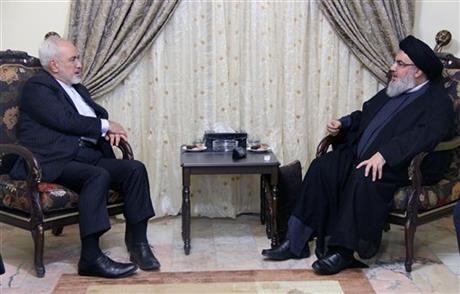
By BASSEM MROUE
Heavy rebel shelling and government airstrikes hit around Syria’s capital Wednesday, killing at least 16 people and wounding scores more just hours before the arrival of Iranian Foreign Minister Mohammed Javad Zarif, activists and state media said.
Zarif is scheduled to arrive Wednesday afternoon in Damascus, likely to discuss a four-point peace plan proposal Iran wants to offer to the United Nations to end Syria’s grinding civil war. But discussions alone of that plan, which reportedly includes a cease-fire and a “national unity government,” likely won’t pause a conflict that’s killed more than 250,000 people since March 2011.
The rebel shelling began around morning rush hour in Damascus, with more than 50 shells striking the capital, including in the upper-class neighborhoods of Abu Rummaneh, Baramkeh and Qasaa, the Britain-based Syrian Observatory for Human Rights said.
The Observatory said the shelling killed one woman and wounded at least 20 people. Syrian state television quoted the Interior Ministry as saying that the shelling killed four people and wounded 58. It blamed “terrorists” for the shelling, as state media always refers those fighting against embattled Syrian President Bashar Assad’s rule.
“We hid for two hours in the bathroom,” said a woman by telephone from Qasaa, who spoke on condition of anonymity for fear of reprisals. “My children woke up terrified. Our windows were shattered and so was my car’s windshield.”
Shortly afterward, government warplanes attacked several rebel-held suburbs of the capital. The Local Coordination Committees said the air raids on Hamouriyeh, Saqba, Kfar Batna, Douma and Arbeen killed 15 and wounded dozens. The Observatory said the airstrikes killed 27 people and wounded more than 120 people.
Differing casualty counts are common in the chaotic aftermath of attacks in Syria.
The attacks come amid the new Iranian diplomatic efforts to end the conflict. Iran is one of Assad’s strongest supporters and the Iranian-backed Lebanese militant group Hezbollah has sent thousands of fighters to Syria to back government forces.
In Beirut, Hezbollah’s leader Sheikh Hassan Nasrallah met with Zarif to discuss regional crises, including Syria’s civil war.
Hezbollah’s Al-Manar television station said Nasrallah and Zarif discussed attempts “to find solutions in more than one country.”



